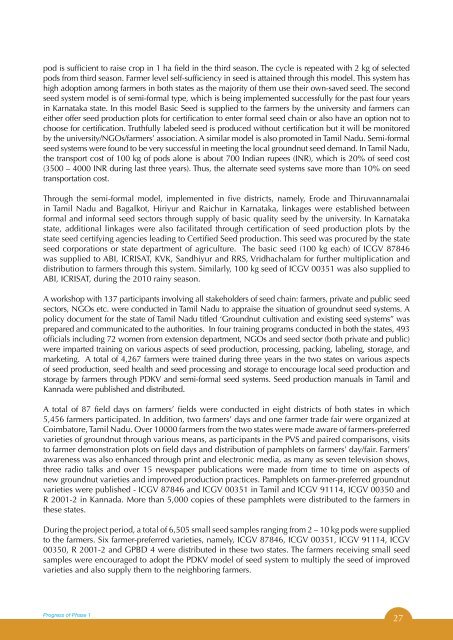Final version of Tropical Legumes II Project Report for Phase 1 - icrisat
Final version of Tropical Legumes II Project Report for Phase 1 - icrisat
Final version of Tropical Legumes II Project Report for Phase 1 - icrisat
You also want an ePaper? Increase the reach of your titles
YUMPU automatically turns print PDFs into web optimized ePapers that Google loves.
pod is sufficient to raise crop in 1 ha field in the third season. The cycle is repeated with 2 kg <strong>of</strong> selected<br />
pods from third season. Farmer level self-sufficiency in seed is attained through this model. This system has<br />
high adoption among farmers in both states as the majority <strong>of</strong> them use their own-saved seed. The second<br />
seed system model is <strong>of</strong> semi-<strong>for</strong>mal type, which is being implemented successfully <strong>for</strong> the past four years<br />
in Karnataka state. In this model Basic Seed is supplied to the farmers by the university and farmers can<br />
either <strong>of</strong>fer seed production plots <strong>for</strong> certification to enter <strong>for</strong>mal seed chain or also have an option not to<br />
choose <strong>for</strong> certification. Truthfully labeled seed is produced without certification but it will be monitored<br />
by the university/NGOs/farmers’ association. A similar model is also promoted in Tamil Nadu. Semi-<strong>for</strong>mal<br />
seed systems were found to be very successful in meeting the local groundnut seed demand. In Tamil Nadu,<br />
the transport cost <strong>of</strong> 100 kg <strong>of</strong> pods alone is about 700 Indian rupees (INR), which is 20% <strong>of</strong> seed cost<br />
(3500 – 4000 INR during last three years). Thus, the alternate seed systems save more than 10% on seed<br />
transportation cost.<br />
Through the semi-<strong>for</strong>mal model, implemented in five districts, namely, Erode and Thiruvannamalai<br />
in Tamil Nadu and Bagalkot, Hiriyur and Raichur in Karnataka, linkages were established between<br />
<strong>for</strong>mal and in<strong>for</strong>mal seed sectors through supply <strong>of</strong> basic quality seed by the university. In Karnataka<br />
state, additional linkages were also facilitated through certification <strong>of</strong> seed production plots by the<br />
state seed certifying agencies leading to Certified Seed production. This seed was procured by the state<br />
seed corporations or state department <strong>of</strong> agriculture. The basic seed (100 kg each) <strong>of</strong> ICGV 87846<br />
was supplied to ABI, ICRISAT, KVK, Sandhiyur and RRS, Vridhachalam <strong>for</strong> further multiplication and<br />
distribution to farmers through this system. Similarly, 100 kg seed <strong>of</strong> ICGV 00351 was also supplied to<br />
ABI, ICRISAT, during the 2010 rainy season.<br />
A workshop with 137 participants involving all stakeholders <strong>of</strong> seed chain: farmers, private and public seed<br />
sectors, NGOs etc. were conducted in Tamil Nadu to appraise the situation <strong>of</strong> groundnut seed systems. A<br />
policy document <strong>for</strong> the state <strong>of</strong> Tamil Nadu titled ‘Groundnut cultivation and existing seed systems” was<br />
prepared and communicated to the authorities. In four training programs conducted in both the states, 493<br />
<strong>of</strong>ficials including 72 women from extension department, NGOs and seed sector (both private and public)<br />
were imparted training on various aspects <strong>of</strong> seed production, processing, packing, labeling, storage, and<br />
marketing. A total <strong>of</strong> 4,267 farmers were trained during three years in the two states on various aspects<br />
<strong>of</strong> seed production, seed health and seed processing and storage to encourage local seed production and<br />
storage by farmers through PDKV and semi-<strong>for</strong>mal seed systems. Seed production manuals in Tamil and<br />
Kannada were published and distributed.<br />
A total <strong>of</strong> 87 field days on farmers’ fields were conducted in eight districts <strong>of</strong> both states in which<br />
5,456 farmers participated. In addition, two farmers’ days and one farmer trade fair were organized at<br />
Coimbatore, Tamil Nadu. Over 10000 farmers from the two states were made aware <strong>of</strong> farmers-preferred<br />
varieties <strong>of</strong> groundnut through various means, as participants in the PVS and paired comparisons, visits<br />
to farmer demonstration plots on field days and distribution <strong>of</strong> pamphlets on farmers’ day/fair. Farmers’<br />
awareness was also enhanced through print and electronic media, as many as seven television shows,<br />
three radio talks and over 15 newspaper publications were made from time to time on aspects <strong>of</strong><br />
new groundnut varieties and improved production practices. Pamphlets on farmer-preferred groundnut<br />
varieties were published - ICGV 87846 and ICGV 00351 in Tamil and ICGV 91114, ICGV 00350 and<br />
R 2001-2 in Kannada. More than 5,000 copies <strong>of</strong> these pamphlets were distributed to the farmers in<br />
these states.<br />
During the project period, a total <strong>of</strong> 6,505 small seed samples ranging from 2 – 10 kg pods were supplied<br />
to the farmers. Six farmer-preferred varieties, namely, ICGV 87846, ICGV 00351, ICGV 91114, ICGV<br />
00350, R 2001-2 and GPBD 4 were distributed in these two states. The farmers receiving small seed<br />
samples were encouraged to adopt the PDKV model <strong>of</strong> seed system to multiply the seed <strong>of</strong> improved<br />
varieties and also supply them to the neighboring farmers.<br />
Progress <strong>of</strong> <strong>Phase</strong> 1<br />
27
















